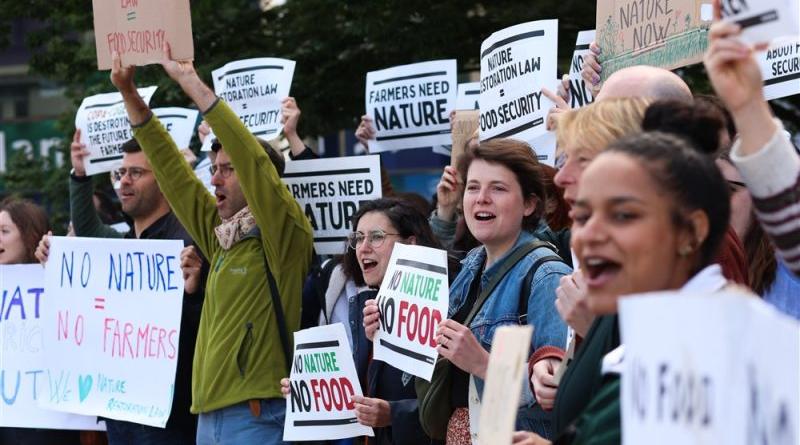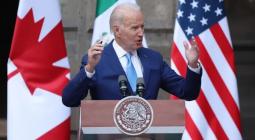We must save the Green Deal to save our future

Several legislative proposals of the Green Deal are being contested, creating tensions within the European Parliament. The EU Nature Restoration Law is paramount for the protection of biodiversity in the continent, and delays in negotiations will be catastrophic, write MEPs Jutta Paulus and Bas Eickhout.
Jutta Paulus and Bas Eickhout are Members of the European Parliament with the Group of the Greens/ European Free Alliance.
The world is literally burning in front of our eyes. Forest fires in Canada are out of control, bringing apocalyptic pictures from New York City like stills from a science fiction doomsday movie.
In Europe, emergency services are fighting fires in several countries before the summer even started. But unlike in a Netflix series, there is no “pause” button. Taking action against the twin crises of climate disruption and biodiversity loss cannot be postponed to another time in the future. When the world burns, we all burn.
The European People’s Party is fuelling this fire. After publishing its “kill list” naming several legislative proposals of the Green Deal as “untimely” already in 2022, it intensified its position in 2023 and finally stopped its work on the nature pillar of the EU Green Deal programme.
After months of constructive negotiations, the once firmly pro-European party decided to refrain from participating in democratic procedures such as political negotiations and compromises and start to campaign against the political project of their own commission president. There is still a full year of legislative work ahead of the European elections, but the EPP’s eye is squinting at national and regional campaigns instead of urgently waiting legislative procedures.
Last Exit Nature Restoration
Europe’s biodiversity is on a knife’s edge. This is the reality we are facing: Around a quarter of known animal and plant species are endangered, half of those critically endangered or facing extinction.
Climate crisis, land use, intensive agriculture with amounts of fertilisers and pesticides unprecedented in 12.000 years and accumulating pollutants are destroying habitats and pushing ever more plant, insect, bird and mammal species towards extinction. The state of Europe’s more fragile ecosystems is particularly worrying: According to the European Environment Agency, 81% of protected habitats and 63% of populations of protected animals and plants are not in good condition. Without healthy ecosystems, we will no longer have drinkable water, clean air or fertile soils.
The EU Nature Restoration Law is our last chance to reverse the large-scale loss of biodiversity in Europe. It is the “the climate law of biodiversity” without which Europe will fail not only its biodiversity targets, but also its climate goals. The IPCC’s most recent synthesis report states clearly that restoring carbon-rich ecosystems such as peatlands, forests and seagrass meadows is paramount to keep global heating below 2 degrees Celsius.
The Right is wrong
Despite the alarming scientific reports, the concerns of most European citizens and the Kunming-Montreal agreement at the UN Biodiversity Conference COP15, the EPP has joined forces with the far right to get the Nature Restoration Law off the table. With this approach of ignoring the crisis instead of working on solutions, they are not only putting nature at stake but also the economic future of farmers and fishermen that they pretend to stand up for.
Currently, European legislation is mainly aimed at protecting specific habitats or species, but protection alone is clearly insufficient. Particularly because many of those natural areas are subject to unprecedented pressure from outside that specific area. After all, a bird, bee or butterfly population is not bound to a fenced piece of grassland, but will be affected by increased use of pesticides or nitrogen deposition.
To reverse the biodiversity crisis, we will not get away with merely reserving a piece of land for the rest of earth’s species, we will have to adapt our system in such a way that entire ecosystems can recover.
That is exactly what the Commission is proposing with the Nature Restoration Law. If the law passes, EU countries will have to actively work on restoring all ecosystems in need of restoration, most of which are already existing natural areas.
No Business without Nature
European companies are calling for Nature Restoration to ensure future productivity, especially in the food sector. Without nature, there will not be any business and instead of playing out one against the other, the Nature Restoration Law does take into account all of the current challenges: It offers a lot of room for Member States to make the plans that they submit to the Commission.
Exceptions apply to projects of overriding public interest, such as the energy transition. Second, negotiators, both in Parliament and Council, have built in numerous additional flexibilities and loosened requirements, for instance on agricultural land, forests and non-deterioration of ecosystems.
Turning a blind eye to the biodiversity crisis is just passing problems down to the next generation of farmers and fishermen. If the decline in pollinators and soil quality is not addressed, agriculture will suffer and will only need more chemicals to maintain production.
If the crusade of the Christian Democrats succeeds, it will mean a standstill of European nature policy for years, right in the middle of a crucial decade. We must not let this happen. The destruction of our livelihoods must stop. The EPP must return to their legislative duties and re-join the negotiating table.





